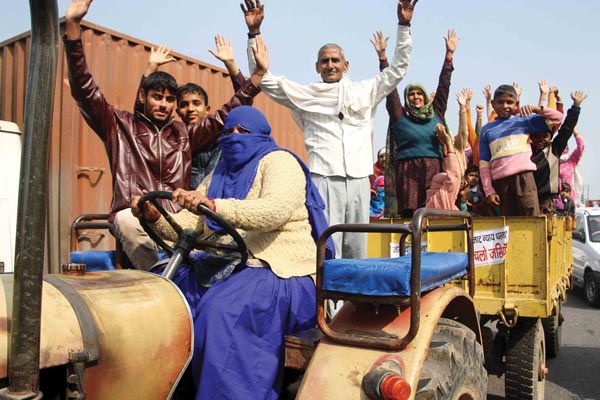IT is indeed ironical. The job reservation policies, especially in the government and public sector jobs, has worked so well that the erstwhile powerful castes, including the upper ones and traditionally well-to-do ‘other backward classes’ that are not a part of the quota system, feel threatened. They have fear this would affect their jobs, incomes, lifestyles and future of their children. Apart from the deep economic impact, they have concerns about the slow, but sure, erosion of their political and social powers. The power cycle, which kept the lower and backward castes out of the system, stands disbanded and is in disarray.
This summarizes the contemporary beginnings of the Jat agitation in Haryana, and its continuance today. The Jats want ‘reserved’ State government jobs, a demand which was granted by the State government last year although the decision was stayed by the Punjab and Haryana High Court. Now, they also want a quota in the central government. In effect, they want a higher say in the government per se, and in governance, or more political power. Those who are opposed to it contend that the Jats already occupy “prestigious” and “prominent” posts in the State government. The result, a chakka jam, or a face-off.
For decades, reservations in employment and education were debated in several nations, including India and the US. They were the attackers and defenders, vociferous supporters and aggressive status quoists. Economics and politics, social transformation and disorders, materialistic aspirations and ambitions, and prestige and honour entangled together to create a ‘quota chaos’. While demands were made to extend quotas to the private sector, critics said that the era of quotas was over as it had empowered several castes in the past seven decades.
Dynamics of ‘State’ jobs
There was a time, several decades ago, when government jobs were arduously desirable. Most families wanted their children, or at least some of them, to be in positions of power for the financial security, social standing, and political stature. You got into such a job, you stayed there until you retired, you commanded a handsome dowry, and you and your family reaped the allied benefits of housing, healthcare, pension and other subsidies. During the 1980s, the lure of the private sector struck the lower and middle classes.
In recent times, the government appeal is back. For several reasons! Job security has emerged as a concern, given the manner in which the private sector has sacked people en masse over the past 3-4 decades. Unlike the past, government salaries have gone up. Although they don’t match the private ones, a mid-level pensioner can earn Rs. 50,000 a month after retirement. There’s a growing breed of middle class, even those which had private sector experiences, who wish to make a difference, transform the nation, and participate in governance.
There are other additional factors. Over the years, the private sector has paid well, but insisted on more working hours. This is restricted in the government only to a few senior people. So, there is less stress and fatigue in the latter. In the private sector, your days are not your days, neither are your nights. You can be called to the office anytime, even if you are on a holiday. This is rare in the government. So, there’s more peace and tranquility in the latter.
Dynamics of quotas
Several studies have proved that reservation has provided more jobs to the lower and backward classes and improved their presence in the government. A recent study on public sector jobs found that “employment quotas are causing SCs (scheduled castes) to get better (salaried) jobs”. The same study concluded that “a 1-percentage point increase in SC employment quota increases the probability of being in a salaried job by 0.4 percentage point.” This is not true for the scheduled tribes (STs) and the effect is minimal or non-existent.
ONE of the reasons for its lack of success among the STs is that the tribal population doesn’t have too many “qualified” people to fill up the available public sector posts. “Second, STs primarily reside in rural areas while the majority of the salaried jobs are in urban areas, and people are unwilling to move because of traditions, cultural reasons and other fears. However, in the case of both SCs and STs, quotas favour the less-educated people, and not the higher-educated ones. The reason: the latter have access to more lucrative jobs.”
However, other studies have acknowledged these positive impacts, but maintained that the changes are skewed. For example, another study on government jobs found, “Generally, reservation is fairly proportionate to the required percentage in Group C and D jobs, but unsatisfactory in the case of A and B category jobs.” In other words, lower categories of jobs accounted for the bulk of the jobs reserved for the SCs and STs—some say the figure is as high as 95 per cent. In fact, the fulfilment of the quotas fell extremely short in the higher categories.
Economics of reservations
On the whole, reservations, and possibility of more and better jobs, didn’t really improve the lifestyles of the SCs and STs. In both, the monthly per capita expenditure (MPCE) didn’t change much. But there was an exception—the cases of less educated SCs. In this specific category, the living standards showed positive changes. As the study on public sector jobs said, “It makes sense that the less educated experience the gains in MPCE since it was the less educated who experienced the gains in probability of having a salaried job.”
The rise of political parties which represent the interests of the lower and backward castes shows that reserved seats have done their jobs; the lower and backward castes have formed new power centres that regularly clash and engage with the erstwhile elite groups
Thanks to quotas, school enrollment of male children increased among the SC families; surprisingly, they had little impact on the education of the girl child. The policies had “significant and negative impact on probability of being a child labour for male child” and “significant and positive impact on probability of being a child labour” on female child. The latter was witnessed even among the ST families. It can imply that once it becomes easier for the males to get jobs, the parents focus on the male’s education, and not child labour. The opposite is true for the girl, who may pitch in with work to make of up for the loss of her brother’s income.
Politics of quotas
Studies have shown that although a certain percentage of seats in the Lok Sabha, State assemblies and other elected representatives are reserved for SCs and STs, the results are not too effective. Thus, “there is a problem of low participation, less articulation, less assertiveness and less independence of SC/ST representatives than their colleagues belonging to high castes,” revealed one study. The question of qualitative representation exists, which may stem from the fact that even reserved seats have substantial proportion of high-caste voters, and the latter’s support is required to win the election. So, the SC/ST legislator is dependent on the traditionally powerful sections.

THE counter to this is the rise of political parties, which represent the interests of the lower and backward castes. This shows that reserved seats have done their jobs; the lower and backward castes have formed new power centres that regularly clash and engage with the erstwhile elite groups. More importantly, in the unreserved constituencies, the SCs, STs and similar castes vote tactically and strategically and can make the difference between a win and loss for any candidate. Thus, the former are wooed by the latter.
Although it’s too early to reach specific conclusions, experts believe that the Dalits and Jats voted tactically in the first few phases of the assembly elections in Uttar Pradesh. The former backed Mayawati’s Bahujan Samaj Party and later decided not to support the BJP, which was unable to get them job reservation in the State. As happens with most things in India, the social structures penetrate into politics and make themselves visible in terms of economic demands. Reservations and quotas are the economic manifestations of this complex process.
Alam Srinivas is a business journalist with almost four decades of experience and has written for the Times of India, bbc.com, India Today, Outlook, and San Jose Mercury News. He has written Storms in the Sea Wind, IPL and Inside Story, Women of Vision (Nine Business Leaders in Conversation with Alam Srinivas),Cricket Czars: Two Men Who Changed the Gentleman's Game, The Indian Consumer: One Billion Myths, One Billion Realities . He can be reached at editor@gfilesindia.com


























































